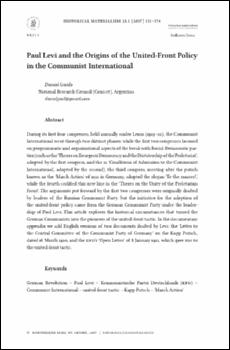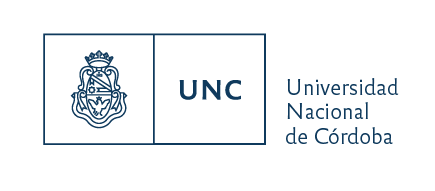| dc.contributor.author | Gaido, Daniel | |
| dc.date.accessioned | 2023-08-22T16:53:19Z | |
| dc.date.available | 2023-08-22T16:53:19Z | |
| dc.date.issued | 2017-04 | |
| dc.identifier.citation | Gaido, Daniel Fernando; Paul Levi and the origins of the united-front policy in the communist international; Brill Academic Publishers; Historical Materialism; 25; 1; 4-2017; 131-174 | es |
| dc.identifier.uri | http://hdl.handle.net/11086/548552 | |
| dc.identifier.uri | https://philarchive.org/archive/GAIPLA | |
| dc.description.abstract | During its first four congresses, held annually under Lenin (1919–22), the Communist International went through two distinct phases: while the first two congresses focused on programmatic and organisational aspects of the break with Social-Democratic parties (such as the ‘Theses on Bourgeois Democracy and the Dictatorship of the Proletariat’, adopted by the first congress, and the 21 ‘Conditions of Admission to the Communist International’, adopted by the second), the third congress, meeting after the putsch known as the ‘March Action’ of 1921 in Germany, adopted the slogan ‘To the masses!’, while the fourth codified this new line in the ‘Theses on the Unity of the Proletarian Front’. The arguments put forward by the first two congresses were originally drafted by leaders of the Russian Communist Party, but the initiative for the adoption of the united-front policy came from the German Communist Party under the leadership of Paul Levi. This article explores the historical circumstances that turned the German Communists into the pioneers of the united-front tactic. In the documentary appendix we add English versions of two documents drafted by Levi: the ‘Letter to the Central Committee of the Communist Party of Germany’ on the Kapp Putsch, dated 16 March 1920, and the KPD’s ‘Open Letter’ of 8 January 1921, which gave rise to the united-front tactic. | es |
| dc.language.iso | eng | es |
| dc.publisher | Faculty of Law and Social Sciences, University of London, United Kingdom | es |
| dc.rights | Attribution-NonCommercial-NoDerivatives 4.0 Internacional | * |
| dc.rights.uri | http://creativecommons.org/licenses/by-nc-nd/4.0/ | * |
| dc.subject | German Revolution | es |
| dc.subject | Paul Levi | es |
| dc.subject | Kommunistische Partei Deutschlands (KPD) | es |
| dc.subject | Communist International | es |
| dc.subject | United front tactic | es |
| dc.subject | Kapp Putsch | es |
| dc.subject | March Action | es |
| dc.title | Paul Levi and the Origins of the United-Front Policy in the Communist International | es |
| dc.type | article | es |
| dc.description.version | info:eu-repo/semantics/publishedVersion | es |
| dc.description.fil | Fil: Gaido, Daniel. Universidad Nacional de Córdoba. Facultad de Ciencias Sociales, Argentina. | es |
| dc.description.fil | Fil: Gaido, Daniel. Universidad Nacional de Córdoba. Facultad de Filosofía y Humanidades. Escuela de Historia, Argentina. | es |
| dc.description.fil | Fil: Gaido, Daniel. Consejo Nacional de Investigaciones Científicas y Técnicas. Centro de Investigaciones y Estudios sobre Cultura y Sociedad, Argentina. | es |
| dc.journal.city | Londres | es |
| dc.journal.country | Reino Unido | es |
| dc.journal.editorial | Brill Academic Publishers | es |
| dc.journal.number | 1 | es |
| dc.journal.pagination | 131–174 | es |
| dc.journal.title | Historical Materialism | es |
| dc.journal.volume | 25 | es |
| dc.identifier.eissn | 1465-4466 | |
| dc.contributor.orcid | https://orcid.org/0000-0001-9660-4834 | es |





